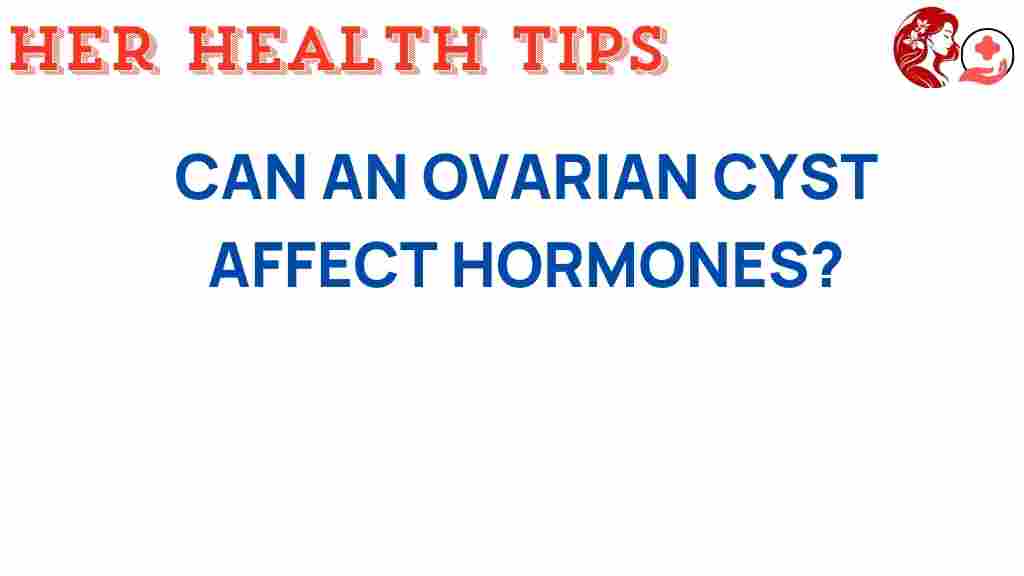Unraveling the Mystery: Can an Ovarian Cyst Disrupt Hormonal Balance?
Ovarian cysts are fluid-filled sacs that develop on the ovaries and are a common occurrence in women’s reproductive health. While many ovarian cysts are harmless and may resolve on their own, they can sometimes affect hormonal balance, leading to various symptoms and complications. Understanding the relationship between ovarian cysts and hormones is vital for women’s health, particularly in the realm of gynecology. In this article, we will explore how ovarian cysts can disrupt hormonal balance, the symptoms associated with this disruption, the diagnosis process, and available treatments.
Understanding Ovarian Cysts
Ovarian cysts can be categorized into different types, with the most common being functional cysts, which are related to the menstrual cycle. Other types include dermoid cysts, endometriomas, and cystadenomas. Each type can have different implications for hormonal balance.
- Functional Cysts: These typically form during the menstrual cycle and are usually harmless.
- Dermoid Cysts: These contain various tissues, including hair and skin, and can affect hormonal levels.
- Endometriomas: These are associated with endometriosis and can significantly disrupt hormonal balance.
- Cystadenomas: These develop from ovarian tissue and can become large, impacting hormone production.
The Role of Hormones in Women’s Health
Hormones play a crucial role in regulating many bodily functions in women, including:
- Menstrual cycle regulation
- Ovulation
- Pregnancy
- Bone health
- Mood and emotional well-being
Any disruption in hormonal balance can lead to symptoms ranging from irregular periods to severe mood swings. When ovarian cysts interfere with hormone production or release, the effects can be significant.
How Ovarian Cysts Disrupt Hormonal Balance
Ovarian cysts can influence hormonal balance in several ways:
- **Hormonal Production:** Cysts can affect the ovaries’ ability to produce hormones like estrogen and progesterone. A functional cyst might lead to an increase in estrogen, causing irregularities in the menstrual cycle.
- **Androgen Levels:** Certain types of cysts, such as those associated with polycystic ovary syndrome (PCOS), can lead to elevated androgen levels, resulting in symptoms like acne, excessive hair growth, and weight gain.
- **Menstrual Irregularities:** Disruption in hormonal levels can lead to missed periods or abnormal bleeding.
Symptoms of Hormonal Imbalance Caused by Ovarian Cysts
Women with ovarian cysts may experience a variety of symptoms, which can indicate hormonal imbalance. Common symptoms include:
- Irregular menstrual cycles
- Pain during ovulation (mittelschmerz)
- Pelvic pain
- Abdominal bloating
- Breast tenderness
- Fatigue
- Weight changes
- Mood swings and emotional distress
If you experience these symptoms, it is essential to consult a healthcare provider to determine the cause and appropriate treatment.
Diagnosis of Ovarian Cysts
Diagnosing ovarian cysts typically involves a combination of medical history, physical examination, and imaging tests. Here’s a step-by-step process:
- Medical History: Your doctor will ask about your menstrual cycle, symptoms, and any family history of ovarian issues.
- Physical Examination: A pelvic exam may be performed to detect any abnormalities in the ovaries or uterus.
- Imaging Tests: Ultrasound is the most common imaging test used to visualize cysts. In some cases, CT scans or MRIs may be needed for further evaluation.
- Blood Tests: Hormonal levels may be checked to assess any imbalances or disorders.
For more information on diagnosis and treatment options, you can visit resources such as the American College of Obstetricians and Gynecologists.
Treatment Options for Ovarian Cysts
Treatment for ovarian cysts varies based on the type of cyst, symptoms, and overall health. Here are some common approaches:
- Watchful Waiting: If the cyst is small and asymptomatic, your doctor may recommend monitoring it for a few menstrual cycles.
- Medications: Hormonal contraceptives can help regulate the menstrual cycle and reduce the risk of new cysts forming.
- Minimally Invasive Surgery: If a cyst is large, persistent, or causing significant symptoms, laparoscopic surgery may be necessary to remove it.
- Hormonal Therapy: In cases where hormonal imbalance is significant, specific hormonal treatments may be prescribed to restore balance.
It is essential to discuss all treatment options with a healthcare professional to determine the best course of action for your individual situation.
Troubleshooting Tips for Managing Symptoms
Women experiencing symptoms related to ovarian cysts and hormonal imbalance can consider the following tips to help manage their symptoms:
- Maintain a Healthy Diet: Eating a balanced diet rich in fruits, vegetables, whole grains, and lean proteins can support overall hormonal health.
- Regular Exercise: Engaging in physical activity can help regulate hormonal levels and alleviate stress.
- Stress Management: Techniques like yoga, meditation, and deep breathing can help manage stress, which can impact hormonal balance.
- Track Symptoms: Keeping a record of your menstrual cycle and symptoms can help you and your healthcare provider identify patterns and make informed decisions.
- Stay Hydrated: Drinking plenty of water supports overall health and can help alleviate bloating.
Conclusion
Ovarian cysts are a common aspect of women’s reproductive health, but they can significantly affect hormonal balance. By understanding the relationship between ovarian cysts and hormones, the symptoms they cause, and the available diagnostic and treatment options, women can take proactive steps to manage their health. If you suspect you have an ovarian cyst or are experiencing symptoms of hormonal imbalance, it is essential to seek advice from a healthcare professional specializing in gynecology. Early diagnosis and intervention can help ensure a healthier reproductive system and improve overall well-being.
For more information on women’s health and reproductive issues, consider visiting the World Health Organization’s website for valuable resources and guidance.
This article is in the category Reproductive and created by HerHealthTips Team
